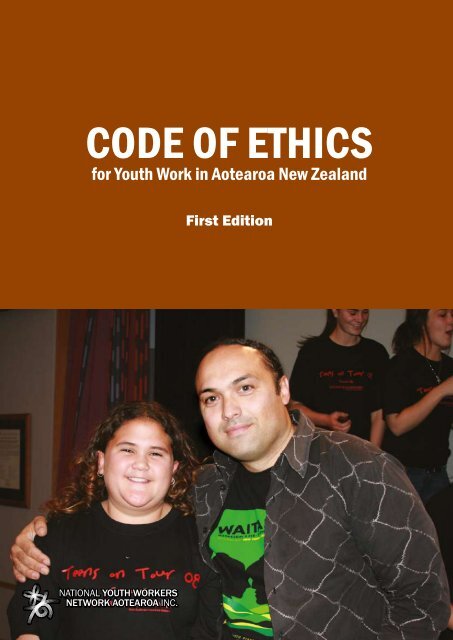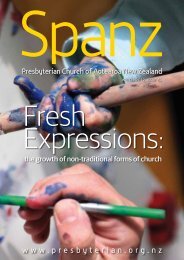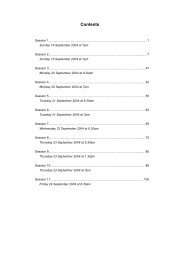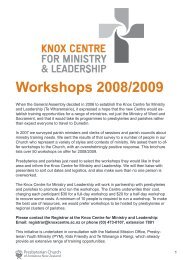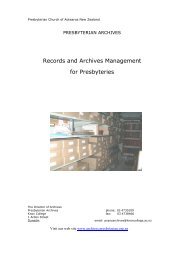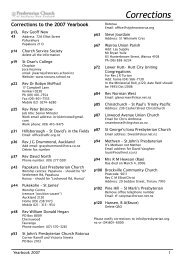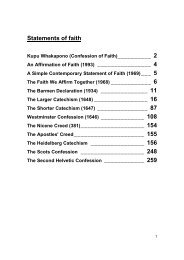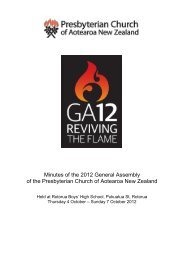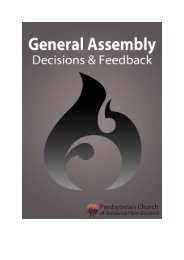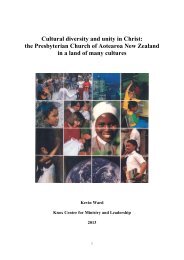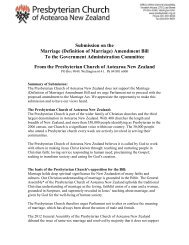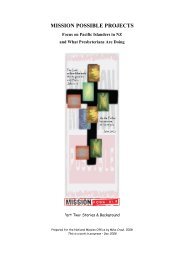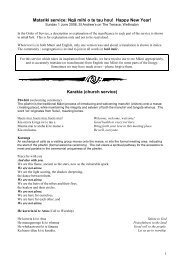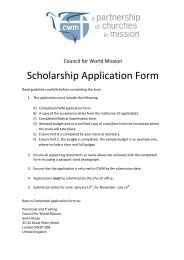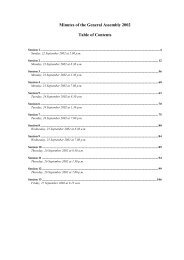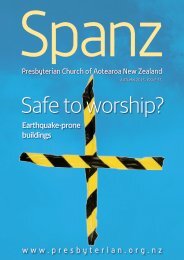CODE OF ETHICS - Ministry of Youth Development
CODE OF ETHICS - Ministry of Youth Development
CODE OF ETHICS - Ministry of Youth Development
You also want an ePaper? Increase the reach of your titles
YUMPU automatically turns print PDFs into web optimized ePapers that Google loves.
<strong>CODE</strong> <strong>OF</strong> <strong>ETHICS</strong><br />
for <strong>Youth</strong> Work in Aotearoa New Zealand<br />
First Edition
Code <strong>of</strong> Ethics for <strong>Youth</strong> Work in Aotearoa New Zealand<br />
National <strong>Youth</strong> Workers Network Aotearoa Inc.<br />
First Edition published Wellington, July 2008.<br />
Electronic versions <strong>of</strong> this document are available to download at:<br />
www.youthworkers.net.nz<br />
CREATIVE COMMONS LICENSE:<br />
You are free to share, copy, distribute and transmit the work under the following conditions:<br />
- Attribution. You must attribute the work in the manner specified by National <strong>Youth</strong> Workers<br />
Network Aotearoa Incorporated (the author) but not in any way that suggests that they<br />
endorse you or your use <strong>of</strong> the work.<br />
- Noncommercial. You may not use this work for commercial purposes.<br />
- No Derivative Works. You may not alter, transform, or otherwise change this document.<br />
- For any reuse or distribution, you must make clear to others the license terms <strong>of</strong> this work.<br />
The best way to do this is with a link to the National <strong>Youth</strong> Workers Network Aotearoa Inc.<br />
website: www.youthworkers.net.nz<br />
- Any <strong>of</strong> the above conditions may be waived if you get written permission from the copyright<br />
holder.<br />
- Nothing in this license impairs or restricts the author’s moral rights.
<strong>CODE</strong> <strong>OF</strong> <strong>ETHICS</strong><br />
SECTIONS STRUCTURE<br />
1. CONTEXT<br />
. SETTING THE SCENE<br />
2. CLAUSES<br />
. THE HEART <strong>OF</strong> IT<br />
3. REFERENCES &<br />
APPENDICES<br />
. WHERE TO GO FOR MORE INFO<br />
SUBMISSION FORM<br />
MAKE THE NEXT VERSION EVEN BETTER
Code <strong>of</strong> Ethics for <strong>Youth</strong> Work in Aotearoa New Zealand<br />
CONTEXT<br />
Kia tupu te Whakawhanaungatanga
Tupu tē Toi<br />
Whanake te Toi<br />
He Toi ora<br />
He Toi he Toi i ahu mai i Hawaiki<br />
To tau muri ki te Atua<br />
No te mea<br />
Ko taku taha tera<br />
The National <strong>Youth</strong> Workers Network Aotearoa (NYWNA) is extremely proud<br />
to present this first edition <strong>of</strong> the Code <strong>of</strong> Ethics for <strong>Youth</strong> Work in Aotearoa.<br />
This is a milestone in the advancement <strong>of</strong> <strong>Youth</strong> Work in Aotearoa New<br />
Zealand. This document has been written and supported by <strong>Youth</strong> Workers<br />
for <strong>Youth</strong> Workers, and we hope it will be embraced by our sector.<br />
Rod Baxter<br />
Chairperson<br />
NYWNA<br />
James Munroe (Ngati Hine,<br />
Ngatiwai, Ngati Whatua, Ngapuhi,<br />
Te Arawa, Ngati Kahungunu)<br />
Representing Te Uri o Hau,<br />
Kaipara <strong>Youth</strong> Workers Network<br />
and NYWNA Te Rōpū on the CoE<br />
Working Group<br />
VI
Nga Ihirangi<br />
Contents<br />
Kupu Whakataki<br />
Introduction . . . . . . . . . . . . . . . . . . . . . . . . . . . . . . . . . . . . . . . . . . . . . . . . . . . . . . . VIII<br />
Kōrero Huarahi<br />
History ............................................................ IX<br />
Taonga Pūmau<br />
Ethical Practice in Traditions <strong>of</strong> <strong>Youth</strong> <strong>Development</strong> in Aotearoa ............. X<br />
Te Take o Te Matatika<br />
The Purpose <strong>of</strong> the Code <strong>of</strong> Ethics . . . . . . . . . . . . . . . . . . . . . . . . . . . . . . . . . . . . . XII<br />
Ngā Uara Rangatahi<br />
Core Values <strong>of</strong> <strong>Youth</strong> Work . . . . . . . . . . . . . . . . . . . . . . . . . . . . . . . . . . . . . . . . . . . XIII<br />
Hakamāramatanga<br />
Definition <strong>of</strong> <strong>Youth</strong> Work . . . . . . . . . . . . . . . . . . . . . . . . . . . . . . . . . . . . . . . . . . . . . XV<br />
Mahinga Rangatahi Aotearoa<br />
Contexts <strong>of</strong> <strong>Youth</strong> Work in Aotearoa . . . . . . . . . . . . . . . . . . . . . . . . . . . . . . . . . . . . XVI<br />
Whanaketanga<br />
<strong>Youth</strong> <strong>Development</strong> Framework . . . . . . . . . . . . . . . . . . . . . . . . . . . . . . . . . . . . . . . XVII<br />
Haka Whetai-hakamoemiti<br />
Acknowledgements . . . . . . . . . . . . . . . . . . . . . . . . . . . . . . . . . . . . . . . . . . . . . . . . . XVIII<br />
VII
Kupu Whakataki<br />
Introduction<br />
There are four sections within the Code <strong>of</strong> Ethics package:<br />
Part One: Code <strong>of</strong> Ethics for <strong>Youth</strong> Work in Aotearoa New Zealand<br />
(Clauses) - this is the main document that includes the six principles<br />
and 28 clauses <strong>of</strong> the Code <strong>of</strong> Ethics.<br />
Part Two: Context - this section provides an explanation <strong>of</strong> how the Code<br />
<strong>of</strong> Ethics has been developed to date and providing some historical and<br />
contemporary context for the Code <strong>of</strong> Ethics.<br />
References & Appendices: brief summaries <strong>of</strong> documents and other<br />
resources referred to in the Context and Clauses sections.<br />
Submission Form: an explanation <strong>of</strong> the process and template for<br />
people who would like to provide feedback on the First Edition <strong>of</strong> the<br />
Code <strong>of</strong> Ethics.<br />
The Context section needs to be read first, as it provides the background<br />
and context for interpreting the Code <strong>of</strong> Ethics.<br />
Throughout this document the terms young person, young people and<br />
rangatahi are used interchangeably. Whānau and family are also referred<br />
to and can cover the range <strong>of</strong> extended kinship and familiar relationships<br />
that young people are connected to.<br />
In publishing the Code <strong>of</strong> Ethics, it is acknowledged that this is a living<br />
document and should be reviewed bi-annually.<br />
The Code <strong>of</strong> Ethics is intended to be consistent with the responsibilities <strong>of</strong><br />
Tangata Whenua and Tangata Tiriti, agreed to in Te Tiriti o Waitangi.<br />
Another document needs to be written that outlines the responsibilities<br />
and rights <strong>of</strong> Tangata Whenua and Tangata Tiriti in the development and<br />
practice <strong>of</strong> <strong>Youth</strong> Work by, for and with Tangata Whenua in Aotearoa. Future<br />
editions <strong>of</strong> the Code <strong>of</strong> Ethics should include references to the contents <strong>of</strong><br />
such a document.<br />
Te Reo Māori translations have been prepared by Kaumatua for NYWNA<br />
Ruru Hona (Ngati Kahu / Nga Puhi).<br />
The Whakatauki have been provided by Te Rōpū the Maori caucus <strong>of</strong><br />
NYWNA. Translations can be found on the NYWNA website.<br />
The working group encourages <strong>Youth</strong> Workers and others working in the<br />
different settings that <strong>Youth</strong> Work is carried out in (e.g. Pacific, disabilities,<br />
volunteers etc.) to utilise the submission process to have further input into<br />
these documents. It is acknowledged that each group will have their own<br />
processes to implement this.<br />
VIII
Kōrero Huarahi<br />
History<br />
The first time <strong>Youth</strong> Workers nationally discussed having a Code <strong>of</strong> Ethics<br />
was at a <strong>Youth</strong> Workers Hui in 1995 at Ngaruawahia. A workshop was held<br />
as part <strong>of</strong> that Hui and there was an attempt to write a Code. This got<br />
<strong>Youth</strong> Workers discussing and debating ethics in <strong>Youth</strong> Work. In 1997 the<br />
Canterbury <strong>Youth</strong> Workers Collective (CYWC) wrote a Code <strong>of</strong> Ethics for<br />
<strong>Youth</strong> Workers in Canterbury. This Code was adapted from the Western<br />
Australian Code <strong>of</strong> Ethics written by Dr. Howard Sercombe. The CYWC Code<br />
became recognised by the <strong>Youth</strong> Work sector nationally and other <strong>Youth</strong><br />
Worker Networks adapted or adopted this Code.<br />
In 2002 a small group <strong>of</strong> experienced <strong>Youth</strong> Workers met with the Managers<br />
<strong>of</strong> the <strong>Ministry</strong> <strong>of</strong> <strong>Youth</strong> Affairs and the DIA Community <strong>Development</strong><br />
Group. They discussed issues facing <strong>Youth</strong> Workers in Aotearoa including<br />
the disconcerting number <strong>of</strong> <strong>Youth</strong> Workers who had used their power<br />
position to abuse the young people they work with. Together they talked<br />
about the need to have a national Code <strong>of</strong> Ethics, which would hold <strong>Youth</strong><br />
Workers accountable for their practice. A commitment was made to write<br />
such a Code.<br />
In 2007 the National <strong>Youth</strong> Workers Network Aotearoa initiated consultation<br />
(through the Lets Not Be Uncode roadshow) with <strong>Youth</strong> Workers on<br />
desirability and content <strong>of</strong> a national Code <strong>of</strong> Ethics. At the end <strong>of</strong> 2007 a<br />
group <strong>of</strong> <strong>Youth</strong> Workers was selected to write a first edition. This group was<br />
intended to be representative <strong>of</strong> the diversity <strong>of</strong> <strong>Youth</strong> Work in Aotearoa<br />
New Zealand. The Code <strong>of</strong> Ethics Working Group was endorsed by the<br />
NYWNA National Council at the 2007 AGM. Te Rōpū was established at<br />
the same time. A representative <strong>of</strong> Te Rōpū was nominated to sit on the<br />
working group. Te Rōpū and the Working Group have partnered to produce<br />
the First Edition <strong>of</strong> the Code <strong>of</strong> Ethics by June 2008.<br />
The first edition was launched for further consultation at Involve in July<br />
2008. The consultation process is by submissions which close in June 2009.<br />
The submissions will feed into a revised document. The second edition will<br />
be launched at the proposed National <strong>Youth</strong> Work Conference in November<br />
2009. It is anticipated that the Code will be reviewed bi-annually.<br />
IX
Taonga Pūmau<br />
Ethical Practice in Traditions <strong>of</strong><br />
<strong>Youth</strong> <strong>Development</strong> in Aotearoa<br />
Māori <strong>Youth</strong> <strong>Development</strong> Practices<br />
A wide range <strong>of</strong> sources concur that historically young people in Māori<br />
communities participated in a range <strong>of</strong> developmental processes to prepare<br />
them for adulthood and mark the transition to roles <strong>of</strong> responsibility within<br />
their whānau and hapū.<br />
Inter-generational transmission <strong>of</strong> knowledge and values were critical to the<br />
wellbeing <strong>of</strong> the hapū and involved passing on the skills and understanding<br />
that were essential to survival in terms <strong>of</strong> economic and social wellbeing.<br />
Elders were considered a vast repository <strong>of</strong> important information and their<br />
wisdom and knowledge considered essential to the teaching <strong>of</strong> practical<br />
and social skills, ethics and esoteric knowledge. (Hemara, p43)<br />
The development process was initiated before birth and carried on<br />
throughout childhood and adolescence. Children were active participants in<br />
political affairs and were encouraged to engage in community discussions<br />
and activities from an early age. (Hemara, p15)<br />
Common Approaches<br />
Strong bonds between individuals and whānau were based on trust and<br />
respect that ensured the health, survival and growth <strong>of</strong> rangatahi and the<br />
community, and the well being <strong>of</strong> future generations. A range <strong>of</strong> rights <strong>of</strong><br />
passage were used to mark various transitions as the individual moved<br />
from one phase <strong>of</strong> life to another.<br />
At least three strategies were commonly employed to ensure young people<br />
developed in ways that were healthy and equipped the hapū with people<br />
who could protect and enhance the interests <strong>of</strong> the community:<br />
1. Pūkengatanga: One <strong>of</strong> the most common and important strategies<br />
was where an elder (pukenga) took a young person under their care<br />
and taught them directly as a mentor to feed them knowledge. The<br />
student would accompany the elder to hui and special occasions – the<br />
child functioning as a link between generations that ensured survival <strong>of</strong><br />
critical knowledge about connections between people, places and the<br />
natural world. (Stirling, p88-93)<br />
2. Whare Wānanga: Whare Wananga were formal structures established<br />
to pass on specialist skills and knowledge – participants were <strong>of</strong>ten<br />
selected because they displayed giftings in the particular interests<br />
<strong>of</strong> each whare wananga (e.g. diplomatic skills, cultivation, physical<br />
aptitude, carving, etc.) (Royal, p73-79; Best p62-63)<br />
3. Urungatanga: A third approach has been termed ‘education through<br />
exposure’ – where participants were not given formal instruction but<br />
were exposed to a situation and expected to work out what was going<br />
X
on and solve problems that arose. This type <strong>of</strong> education included areas<br />
as diverse as cultivation, childcare, and public occasions such as the<br />
structure and roles within hui and tangi. (Hemara, p21)<br />
Traditionally a code <strong>of</strong> ethical practice existed within every community<br />
through the maintenance <strong>of</strong> tikanga and kawa and practices and concepts<br />
such as tapu, noa, utu, hara, muru and koha. These codes <strong>of</strong> ethics were not<br />
written but were developed and maintained through enduring relationships<br />
within hapū.<br />
Like any society there were challenges and injustices – Māori communities<br />
were not perfect, but tikanga was in place that meant that when people<br />
violated the boundaries established by the community there were<br />
consequences and mechanisms to retain and protect the health <strong>of</strong> the<br />
community.<br />
Te Ao Hou<br />
The arrival <strong>of</strong> other cultures contributed to rapid changes in social structures<br />
that challenged much <strong>of</strong> the long-established social fabric in communities<br />
across Aotearoa.<br />
As the watershed document Puao-Te-Ata-tu 1 described in 1986:<br />
The history <strong>of</strong> New Zealand since colonisation has been the history <strong>of</strong><br />
institutional decisions being made for, rather than by, Māori people.<br />
Key decisions on education, justice and social welfare, for example,<br />
have been made with little consultation with Māori people. Throughout<br />
colonial history, inappropriate structures and Pakeha involvement in<br />
issues critical for Māori have worked to break down traditional Māori<br />
society by weakening its base - the whānau, the hapū, the iwi. It has<br />
been almost impossible for Māori to maintain tribal responsibility for<br />
their own people. (p. 17)<br />
Since European settlement, Māori have continued to retain the values,<br />
practices and beliefs <strong>of</strong> their tupuna and have endeavoured to protect their<br />
right to raise their young in ways that keep them connected as Tangata<br />
Whenua.<br />
All <strong>Youth</strong> Workers regardless <strong>of</strong> their awareness <strong>of</strong> the situation, participate<br />
in one way or another in this ongoing process.<br />
<strong>Youth</strong> Workers, from all cultural backgrounds, have a unique contribution<br />
to <strong>of</strong>fer whānau in strengthening the relationship between rangatahi and<br />
their whānau, marae, hapū and iwi.<br />
A New Code <strong>of</strong> Ethics<br />
This Code <strong>of</strong> Ethics for <strong>Youth</strong> Workers in Aotearoa presents another powerful<br />
opportunity to support the re-establishment <strong>of</strong> strong healthy relationships,<br />
between rangatahi and their whānau, marae, hapū and iwi.<br />
This document provides <strong>Youth</strong> Workers with guidance on how they can<br />
make a significant contribution to supporting Māori development in every<br />
context and community. As a living document it is anticipated that this<br />
guidance will be refined over time as the document evolves in response to<br />
further developments in the sector and society at large.<br />
1<br />
Ministerial Advisory Committee on a Maori Perspective for the Department <strong>of</strong> Social<br />
Welfare in New Zealand, Wellington, 1986. Ref: www.msd.govt.nz/documents/publications/<br />
msd/puaoteatatu.pdf<br />
XI
Te Take o Te Matatika<br />
Purpose <strong>of</strong> the Code <strong>of</strong> Ethics<br />
Ethics are principles that are based in values. These ethics guide our<br />
behaviour.<br />
The <strong>Youth</strong> Work relationship is both a privileged relationship and a power<br />
relationship. This is what makes ethics central to <strong>Youth</strong> Work. A power<br />
relationship is legitimate where power is given voluntarily and without<br />
coercion. Abuse <strong>of</strong> this power happens when the <strong>Youth</strong> Worker uses the<br />
power given by a young person to further their own interest to the detriment<br />
<strong>of</strong> the interests <strong>of</strong> the young person.<br />
This Code <strong>of</strong> Ethics provides an agreed set <strong>of</strong> guidelines for <strong>Youth</strong> Work in<br />
Aotearoa New Zealand to ensure that <strong>Youth</strong> Work is carried out in a safe,<br />
skilled, ethical manner. It is one <strong>of</strong> the ways <strong>Youth</strong> Workers hold each other<br />
accountable for our practice, and in doing so protects the credibility <strong>of</strong><br />
<strong>Youth</strong> Work.<br />
It also provides <strong>Youth</strong> Workers with a frame <strong>of</strong> reference from which to<br />
develop ethical awareness, to create discussion and debate <strong>of</strong> ethical<br />
issues and to implement good and ethical practice for both <strong>Youth</strong> Workers<br />
and young people.<br />
XII
Ngā Uara<br />
Core Values <strong>of</strong> <strong>Youth</strong> Work<br />
Āhuatanga Rangatahi<br />
Young Person Centred<br />
• identifies the cultural connections that young people have<br />
• recognises that young people do not exist in isolation from others<br />
• tips the balance <strong>of</strong> power in young people’s favour<br />
• works with young people from a strengths-based approach so they can<br />
achieve their full potential<br />
• works holistically taking into account all <strong>of</strong> the obligations, opportunities,<br />
potential and limitations that exist for young people<br />
• fosters young people’s identity development, social skills, emotional<br />
learning and cultural development<br />
• maintains unconditional positive regard for young people even if they<br />
are exhibiting challenging behaviours<br />
Āhua Whānaunga<br />
Relationship Focused<br />
• works to strengthen positive relationships between young people<br />
and their whānau/family, their communities/hapū, peer groups and<br />
institutions (i.e. education, health and justice systems)<br />
• nurtures quality relationships between young people and <strong>Youth</strong><br />
Workers<br />
• nurtures respect and non-judgmental attitudes<br />
• promotes fun, dynamism and creativity<br />
• values the worth in all young people<br />
• promotes inclusive approaches that recognise all young people have<br />
different strengths and needs<br />
• allows young people to develop their unique identity<br />
• assists young people in adjusting to change and harnessing opportunities<br />
XIII
Tikanga me te Horopaki<br />
Culture and Context<br />
• upholds the principles <strong>of</strong> Te Tiriti o Waitangi and seeks to support Māori<br />
leadership over Māori communities and taonga<br />
• recognises the cultural, historical, economic, social and political contexts<br />
that young people live in<br />
• seeks to understand and respect young people within their cultural<br />
context<br />
• affirms the diversity <strong>of</strong> young people and other groups within society<br />
• actively confronts discrimination<br />
• acknowledges the value and diversity <strong>of</strong> spirituality<br />
• encourages service to others and unconditional giving<br />
• respects the environments (including natural ecology) we live in<br />
Iwi Whānui<br />
Community Contributors<br />
• encourages young people to be agents <strong>of</strong> change - both relational and<br />
systemic<br />
• values young people as contributors to society<br />
• advocates active participation <strong>of</strong> young people in their communities<br />
• encourages and supports young people to take responsibility as active<br />
members <strong>of</strong> whānau, hapū, iwi, places <strong>of</strong> learning and work and peer<br />
groups<br />
• encourages and supports young people to take responsibility as active<br />
global, national and local citizens<br />
XIV
Hakamāramatanga<br />
Definition <strong>of</strong> <strong>Youth</strong> Work<br />
The following definition is adapted from Real Work, a national report on the<br />
state <strong>of</strong> <strong>Youth</strong> Work in Aotearoa carried out by the National <strong>Youth</strong> Workers<br />
Network Aotearoa (NYWNA) and published in 2006.<br />
This definition is not nationally recognised. NYWNA are carrying out<br />
a consultation process with <strong>Youth</strong> Workers in 2008 through regional<br />
workshops and a discussion paper. The aim is to have a nationally<br />
recognised definition <strong>of</strong> <strong>Youth</strong> Work by 2009.<br />
<strong>Youth</strong> Workers enter the worlds <strong>of</strong> young people aged 10-24 and contribute<br />
to their development by:<br />
Providing services and meeting needs<br />
<strong>Youth</strong> Workers find entry points into the worlds <strong>of</strong> young people through<br />
running activities, providing services or simply being present in those<br />
worlds. Therefore <strong>Youth</strong> Work is not defined by any particular activity.<br />
Two key issues are whether the activity is being facilitated in a safe manner,<br />
and whether it is actually meeting the needs <strong>of</strong> those involved (<strong>of</strong>ten<br />
indicated by whether they are involved.<br />
Building relationships<br />
It is the place <strong>of</strong> relationships that distinguishes <strong>Youth</strong> Work from other<br />
pr<strong>of</strong>essions which also include young people in their scope. Most other<br />
pr<strong>of</strong>essions build relationships in order to deliver a service (e.g. Social<br />
Work or Education). <strong>Youth</strong> Workers provide a service in order to build a<br />
relationship. Connecting with young people in their worlds, in ethical and<br />
holistic relationships, is at the heart <strong>of</strong> <strong>Youth</strong> Work practice. Research<br />
suggests that significant connection with adults in the context <strong>of</strong> meaningful<br />
activities is central to the development <strong>of</strong> young people.<br />
Building connection to and participation in<br />
communities<br />
If adolescence describes a period <strong>of</strong> transition between childhood and<br />
adulthood, the end goal <strong>of</strong> <strong>Youth</strong> Work is the integration <strong>of</strong> the young person<br />
into various expressions <strong>of</strong> community.<br />
A key role <strong>of</strong> <strong>Youth</strong> Work is helping young people, and especially those that<br />
have become alienated or isolated, to discover healthy communities, build<br />
connections and develop skills for participation in them as an adult.<br />
XV
Mahinga Rangatahi Aotearoa<br />
Contexts <strong>of</strong> <strong>Youth</strong> Work in<br />
Aotearoa New Zealand<br />
<strong>Youth</strong> Work in New Zealand is carried out in many different contexts<br />
including but not limited to:<br />
• Whānau/Family<br />
• Marae<br />
• Hapū/Iwi<br />
• Voluntary Sector<br />
• Māori Organisations<br />
• NGOs<br />
• Statutory organisation<br />
• School<br />
• Tertiary Education<br />
• Alternative Education<br />
• Training<br />
• Employment<br />
• Church/Faith-based<br />
• Pasifika<br />
• Case work<br />
• <strong>Youth</strong> Centres/cafes<br />
• Diverse sexualities and genders<br />
(queer)<br />
• Specialised <strong>Youth</strong> Services<br />
• <strong>Youth</strong> Health Centres<br />
• Refugee and Migrant<br />
• Ethnic Groups<br />
• Sports and Recreation<br />
• <strong>Youth</strong> Justice<br />
• Neighbourhood / Community<br />
<strong>Development</strong><br />
• Residential Facilities<br />
• Health Services<br />
• People <strong>of</strong> mixed abilities<br />
• Rural/Urban<br />
• ABL (Adventure Based<br />
Learning)<br />
• Camps<br />
• Outdoor Pursuits/Recreation<br />
• <strong>Youth</strong> groups and clubs<br />
• Uniformed Groups (<strong>Youth</strong><br />
Service Organisations)<br />
• Mentoring Programmes<br />
• Kapahaka/Mau Rakau<br />
• Performing Arts and Visual Arts<br />
• Rites <strong>of</strong> Passage Programmes<br />
<strong>Youth</strong> Workers work with young people in these contexts to create<br />
opportunities for them to meet, make friends, participate in a range <strong>of</strong><br />
experiences together and reflect on their personal and group development<br />
and wider social, economic and cultural contexts.<br />
Opportunities are provided for <strong>Youth</strong> Workers to engage in quality<br />
relationships with young people and to respond to youth issues. These<br />
things are central to the development <strong>of</strong> the <strong>Youth</strong> Work relationship and<br />
lead to positive youth development outcomes.<br />
This Code <strong>of</strong> Ethics seeks to encompass and value activities that are carried<br />
out in all <strong>Youth</strong> Work contexts.<br />
XVI
Whanaketanga<br />
<strong>Youth</strong> <strong>Development</strong><br />
Framework<br />
The clauses <strong>of</strong> the Code <strong>of</strong> Ethics have been strategically aligned with the<br />
six principles <strong>of</strong> the <strong>Youth</strong> <strong>Development</strong> Strategy <strong>of</strong> Aotearoa.<br />
The Strategy is based on a positive youth development approach and a<br />
common understanding <strong>of</strong> what needs to happen for young people. Best<br />
<strong>Youth</strong> Work practice fits within this framework as <strong>Youth</strong> Workers play a vital<br />
role in supporting young people’s positive development.<br />
The non-formal contexts in which <strong>Youth</strong> Work takes place are especially<br />
conducive to the development <strong>of</strong> social environments where young people<br />
are accepted, can explore and develop new friendships, seek challenge<br />
and take a variety <strong>of</strong> responsibilities.<br />
<strong>Youth</strong> Workers, in partnership with young people, seek to establish positive<br />
social settings; warm supportive relationships; processes which facilitate<br />
growth <strong>of</strong> young people; opportunities which help young people to be all<br />
they can be; and provide a foundation for independent choice, personal<br />
autonomy and responsible behaviour. These are settings where adults<br />
believe in young people and where young people feel safe, cared for, valued<br />
and appreciated. They create settings and processes that if managed<br />
sensitively by skilled <strong>Youth</strong> Workers, can lead to the positive development<br />
and enhancement <strong>of</strong> social and emotional competence <strong>of</strong> young people.<br />
The goals <strong>of</strong> the Strategy provide a framework that can be applied to the<br />
many settings and organisations that contribute to youth development.<br />
The four goals <strong>of</strong> the Strategy are:<br />
1. Ensuring a consistent strengths-based youth development approach;<br />
2. Developing skilled people to work with young people;<br />
3. Creating opportunities for young people to actively participate and<br />
engage; and<br />
4. An informed approach – building on youth development through<br />
information.<br />
One <strong>of</strong> the intentions <strong>of</strong> our Code <strong>of</strong> Ethics is to reflect how ethical <strong>Youth</strong><br />
Work supports young people’s positive development.<br />
The six principles as they appear in the Strategy are:<br />
1. <strong>Youth</strong> development is shaped by the ‘big picture’;<br />
2. <strong>Youth</strong> development is about young people being connected;<br />
3. <strong>Youth</strong> development is based on a consistent strengths-based<br />
approach;<br />
4. <strong>Youth</strong> development is triggered when young people fully participate;<br />
5. <strong>Youth</strong> development happens through quality relationships; and<br />
6. <strong>Youth</strong> development needs good information.<br />
XVII
We have strategically changed the order <strong>of</strong> the YDSA principles in our Code<br />
<strong>of</strong> Ethics. The change reflects the significance <strong>of</strong> different principles in an<br />
ethical framework for <strong>Youth</strong> Work.<br />
Principle 4 relating to quality relationships appears first in our Code <strong>of</strong> Ethics<br />
as these relationships are the heart <strong>of</strong> <strong>Youth</strong> Work. The unique nature <strong>of</strong><br />
the <strong>Youth</strong> Work relationship is one <strong>of</strong> the key reasons that the Code <strong>of</strong><br />
Ethics is necessary. The remaining principles flow from this.<br />
Hakawhetai-hakamoemiti<br />
Acknowledgements<br />
The National <strong>Youth</strong> Workers Network Aotearoa (NYWNA) wishes to<br />
acknowledge all <strong>of</strong> the people who have contributed to the development <strong>of</strong><br />
the First Edition <strong>of</strong> the National <strong>Youth</strong> Work Code <strong>of</strong> Ethics.<br />
This process has been led by John Harrington (NYWNA Director), whose<br />
vision and passion for <strong>Youth</strong> Work is inspirational and respected throughout<br />
Aotearoa New Zealand and beyond.<br />
We want to thank all the <strong>Youth</strong> Workers from around New Zealand<br />
who participated in the consultation roadshow ‘Let’s Not Be Uncode’.<br />
The discussions and debates were inspiring as <strong>Youth</strong> Workers had an<br />
opportunity to take a step back from their work and discuss ethics with<br />
their co-workers and colleagues. Thank you to all the <strong>Youth</strong> Workers who<br />
contributed feedback through email and other forms <strong>of</strong> communication.<br />
Acknowledgement goes to the Working Group who had the daunting task <strong>of</strong><br />
writing a Code <strong>of</strong> Ethics that would encompass the diversity <strong>of</strong> <strong>Youth</strong> Work<br />
in Aotearoa. This group was made up <strong>of</strong> eight experienced <strong>Youth</strong> Workers<br />
from around the country who registered interest, were selected by the<br />
NYWNA Board and endorsed by the NYWNA National Council.<br />
Working Group members:<br />
James Munroe (Ngatiwai, Ngati Whatua, Ngapuhi, Te Arawa, Ngati<br />
Kahungunu): Te Uri o Hau / Kaipara <strong>Youth</strong> Workers Network – representing<br />
Te Rōpū (NYWNA Māori Caucus)<br />
Nathan Brown: OUT THERE! – representing the voice <strong>of</strong> <strong>Youth</strong> Workers<br />
supporting queer young people and a NYWNA Board member<br />
Toni (Antz) Burgess: Workforce <strong>Development</strong> Ltd, <strong>Youth</strong> Work qualification<br />
Tutor – bringing a voice from the adventure, tertiary and disability<br />
sectors<br />
Colin Eriksen (QBL): <strong>Youth</strong> One Stop Shop (YOSS) Palmerston North –<br />
XVIII
community based <strong>Youth</strong> Worker<br />
Rebekah Siave: National Council for Young Catholics – bringing a faith<br />
based perspective<br />
Jane Zintl: Consultant contracted to write the Code - qualified Solicitor<br />
and volunteer <strong>Youth</strong> Worker with experience in youth law<br />
John Harrington: Director, National <strong>Youth</strong> Workers Network Aotearoa and<br />
the Working Group Facilitator<br />
Te Rōpū have participated in the Code <strong>of</strong> Ethics process and partnered<br />
with the Working Group in producing the First Edition. Ruru Hona, the<br />
NYWNA Kaumatua has generously guided Te Rōpū in the development <strong>of</strong><br />
the Code.<br />
Ariana Elley is acknowledged for all the communication and support she<br />
has provided to the Working Group and Te Rōpū. Ariana gave her all to this<br />
project and gave the Director collegial encouragement and support.<br />
Mark Farrar and the Wellington City Council generously provided a space<br />
for the Working Group to meet eight times over six months.<br />
Chuck Ngaira (Te Aitanga-a-Hauiti), a youth worker with Te Ora Hou Te<br />
Tairawhiti provided the kowhaiwhai design used in the document.<br />
Photographs were generously provided by YCD, Te Ora Hou Aotearoa and<br />
Praxis.<br />
AHI International (www.ahi.co.nz) designed the document.<br />
JR McKenzie Trust provided the core project funding that enabled the<br />
Working Group to be able to meet and write the Code with the support<br />
<strong>of</strong> a skilled contractor, and have demonstrated enduring support for the<br />
development <strong>of</strong> <strong>Youth</strong> Work in Aotearoa New Zealand over many years.<br />
XIX
Code <strong>of</strong> Ethics for <strong>Youth</strong> Work in Aotearoa New Zealand<br />
CLAUSES
He Mihi<br />
E nga Iwi, e nga mana, e nga reo, e nga kārangatanga maha,<br />
Tēnā ra koutou katoa.<br />
Nga mihi arohanui ki ā Io-matua-kore o te runga rawa,<br />
Ko ia te tīmatatanga me te otinga o nga mea katoa<br />
Mai Rangi-nui ki Papa-tū-a-nuku tai āwhio i tēnei ao.<br />
Nga mihi atu ēnei ki nga maunga, nga awa me nga whenua,<br />
tēnā koe, tēnā koutou, tēnā ra koutou katoa.<br />
Nga mihi ēnei ki nga mana whenua me nga iwi o nga hau e wha,<br />
No reira tēnā koe, tēnā koutou, tēnā ra koutou katoa.<br />
Ko tēnei te mihi tino tapu, ki a koutou nga kaihautu o nga rangatahi katoa<br />
o te motu nei, tēnā ra koutou, nā koutou i whārikitia ēnei tikanga matatika ī<br />
te hakamana, hakakaha o koutou huarahi kia tae atu ki taua taumata.<br />
Me inoi atu ki nga kaitiaki ki te hakamanatia, ki te hakataputia ēnei tikanga<br />
matatika kia honotia nga mahinga rangatahi o tēnei motu.<br />
No reira e nga Iwi, e nga mana, e nga reo, e nga kārangatanga maha.<br />
Tēnā koe, tēnā koutou, tēnā ra koutou katoa<br />
Ruru Hona (Ngati Kahu, Nga Puhi)<br />
Kaumatua<br />
National <strong>Youth</strong> Workers Network Aotearoa<br />
2
Ngā Ihirangi<br />
Contents<br />
1 Whanaungatanga / Quality Relationships ..................................... 5<br />
1.1 Te Kawenga / Your Primary Relationship . . . . . . . . . . . . . . . . . . . . . . . . . . . . . . . . . . . . . . . . 6<br />
1.2 Wehenga Tumanako / Behaviour Covered by the Code . . . . . . . . . . . . . . . . . . . . . . . . . . . . 6<br />
1.3 Arahitanga / Your Conduct . . . . . . . . . . . . . . . . . . . . . . . . . . . . . . . . . . . . . . . . . . . . . . . . . . . 6<br />
1.4 Puatatanga / Being Transparent . . . . . . . . . . . . . . . . . . . . . . . . . . . . . . . . . . . . . . . . . . . . . . 7<br />
1.5 Whakaae Tika / Obtaining Informed Consent .................................... 7<br />
1.6 Noho Matatapu / Confidentiality ............................................... 7<br />
1.7 Āhua Tika / Boundaries .......................................................8<br />
1.8 Manatu Tangata / Sexual Boundaries . . . . . . . . . . . . . . . . . . . . . . . . . . . . . . . . . . . . . . . . . . .8<br />
1.9 Noatanga / Knowing Your Limits . . . . . . . . . . . . . . . . . . . . . . . . . . . . . . . . . . . . . . . . . . . . . . .9<br />
1.10 Utu Painga / Personal Agendas . . . . . . . . . . . . . . . . . . . . . . . . . . . . . . . . . . . . . . . . . . . . . . . .9<br />
1.11 Āhua Kōrero, Ahua Taonga / Exchanges between Young People and <strong>Youth</strong> Workers . . . 10<br />
1.12 Āhua me te Oranga / Diversity and Cultural Safety . . . . . . . . . . . . . . . . . . . . . . . . . . . . . . 10<br />
2 Hononga / Connectedness . . . . . . . . . . . . . . . . . . . . . . . . . . . . . . . . . . . . . . . . . . . . . . . . 11<br />
2.1 Papakainga / Ensuring Key Connections . . . . . . . . . . . . . . . . . . . . . . . . . . . . . . . . . . . . . . . 12<br />
2.2 Tautauamoa / Working Collaboratively . . . . . . . . . . . . . . . . . . . . . . . . . . . . . . . . . . . . . . . . 12<br />
3 Hakamanatia Ngā Uara Rangatahi / Consistent Strengths-Based Approach ....... 13<br />
3.1 Hakapakaritanga / Working Holistically ........................................ 14<br />
3.2 Āhua Pononga / Working Positively . . . . . . . . . . . . . . . . . . . . . . . . . . . . . . . . . . . . . . . . . . . .14<br />
3.3 Tiakitanga / Looking After Yourself . . . . . . . . . . . . . . . . . . . . . . . . . . . . . . . . . . . . . . . . . . . 14<br />
3.4 Whakahaeretanga / Supervision ............................................. 15<br />
3.5 Matatau / Self Awareness . . . . . . . . . . . . . . . . . . . . . . . . . . . . . . . . . . . . . . . . . . . . . . . . . . 15<br />
4 Urunga / <strong>Youth</strong> Participation . . . . . . . . . . . . . . . . . . . . . . . . . . . . . . . . . . . . . . . . . . . . . . 16<br />
4.1 Hiringa / Self determination ................................................. 17<br />
4.2 Hakamanatia / Empowerment ............................................... 17<br />
5 Te Ao Rangatahi / Big Picture .............................................. 18<br />
5.1 Ōu Tikanga / Rights and Responsibilities . . . . . . . . . . . . . . . . . . . . . . . . . . . . . . . . . . . . . . .19<br />
5.2 Nga Mahi Ora / Safe Practice . . . . . . . . . . . . . . . . . . . . . . . . . . . . . . . . . . . . . . . . . . . . . . . . 19<br />
5.3 Kawenga / Agents <strong>of</strong> Change ................................................ 20<br />
6 Hakamanatia te Whanaketanga / <strong>Youth</strong> <strong>Development</strong> Needs Good Information .... 21<br />
6.1 Māramatia Aotearoa / Understanding Aotearoa New Zealand . . . . . . . . . . . . . . . . . . . . . 22<br />
6.2 Mana Akoranga / Training/Pr<strong>of</strong>essional <strong>Development</strong> . . . . . . . . . . . . . . . . . . . . . . . . . . . . 22<br />
6.3 Rangahau me Wariutanga / Research and Evaluation . . . . . . . . . . . . . . . . . . . . . . . . . . . 22<br />
3
Please note:<br />
● The NYWNA requires that the Code <strong>of</strong> Ethics clauses be read in<br />
conjunction with the Context Document.<br />
● <strong>Youth</strong> Workers may be both voluntary and/or paid for their work with<br />
young people.<br />
● The ethical responsibilities <strong>of</strong> <strong>Youth</strong> Workers, particularly volunteers,<br />
are in some circumstances shared with their organisation; all parties<br />
should be clear about their particular responsibilities.<br />
● This Code <strong>of</strong> Ethics is intended to be consistent with the responsibilities<br />
<strong>of</strong> Tangata Whenua and Tangata Tiriti agreed to in Te Tiriti o Waitangi.<br />
● Throughout this Code <strong>of</strong> Ethics the terms young person, young people<br />
and rangatahi are used interchangeably. Whanau and family are also<br />
referred to and can cover the range <strong>of</strong> extended kinship and familiar<br />
relationships that young people are connected to.<br />
● <strong>Youth</strong> Work is carried out with individual young people and groups <strong>of</strong><br />
young people. The use <strong>of</strong> the phrases young person and young people<br />
in this document refers to both these contexts.<br />
● Future editions <strong>of</strong> this Code <strong>of</strong> Ethics should be bi-lingual.<br />
● In publishing this Code <strong>of</strong> Ethics, it is acknowledged that this is a living<br />
document and should be reviewed bi-annually.<br />
4
SECTION 1<br />
WHĀNAUNGATANGA<br />
QUALITY RELATIONSHIPS<br />
Quality relationships are essential to a young person’s<br />
development.<br />
It is in this context that <strong>Youth</strong> Work exists.<br />
Young people exist not only in the times and places<br />
that are known to the <strong>Youth</strong> Worker; they come from<br />
families and communities with long histories and<br />
futures to come. <strong>Youth</strong> Workers need to recognise this<br />
reality and understand its impact on the way they work.<br />
This principle acknowledges the importance <strong>of</strong><br />
supporting and equipping <strong>Youth</strong> Workers for nurturing<br />
successful relationships with young people. As such,<br />
<strong>Youth</strong> Workers provide services, programmes, events<br />
or activities for the purpose <strong>of</strong> building meaningful<br />
relationships with young people.<br />
He aha te mea nui o te ao? He tangata, he tangata,<br />
he tangata!<br />
5
1.1<br />
Te Kawenga<br />
Your Primary Relationship<br />
In the <strong>Youth</strong> Work context, and taking into account <strong>of</strong> the <strong>Youth</strong> Worker’s<br />
legal obligations, cultural considerations, obligations to the whanau/family<br />
and despite the many competing demands on them, the <strong>Youth</strong> Worker’s<br />
primary relationship is with the young person they engage with.<br />
The <strong>Youth</strong> Work relationship begins when the <strong>Youth</strong> Worker engages<br />
with the young person as a <strong>Youth</strong> Worker, and ceases by necessity or by<br />
agreement (expressed or implied). The seamless nature <strong>of</strong> <strong>Youth</strong> Work<br />
is acknowledged and <strong>Youth</strong> Workers will manage transitioning between<br />
different forms <strong>of</strong> relationship with care.<br />
Where a conflict <strong>of</strong> interest exists between more than one young person,<br />
it will be resolved in ways which minimise harm to all parties, but with<br />
particular consideration to those least advantaged by the outcome.<br />
1.2<br />
Wehenga Tumanako<br />
Behaviour Covered by the Code<br />
<strong>Youth</strong> Workers will be positive role models. This Code covers any behaviour,<br />
whether connected to their work or personal time, which relates to or<br />
affects a <strong>Youth</strong> Worker’s practice.<br />
1.3<br />
Arahitanga<br />
Your Conduct<br />
<strong>Youth</strong> Workers will perform their work honestly and impartially, and avoid<br />
situations which might compromise their integrity.<br />
<strong>Youth</strong> Workers will carry out their work in an efficient and competent<br />
manner.<br />
<strong>Youth</strong> Workers will avoid words and actions (e.g. dress, flirting, <strong>of</strong>fensive<br />
language, put downs, body language, and unnecessary or inappropriate<br />
touch) that could be misunderstood or cause <strong>of</strong>fence.<br />
<strong>Youth</strong> Workers should avoid activities which would bring young people,<br />
fellow workers, their organisation, or <strong>Youth</strong> Work into disrepute.<br />
6
1.4<br />
Puatatanga<br />
Being Transparent<br />
<strong>Youth</strong> Workers will be open, honest and accountable to young people.<br />
Where a programme and/or organisation operates from a particular value<br />
basis, this will be clearly stated.<br />
<strong>Youth</strong> Workers recognise they may be in situations with young people which<br />
leave both parties vulnerable (including being isolated with a young person,<br />
having young people in their home etc.). <strong>Youth</strong> Workers will be open and<br />
honest with their supervisor, their organisation, colleagues and appropriate<br />
others about these situations.<br />
1.5<br />
Whakaae Tika<br />
Obtaining Informed Consent<br />
<strong>Youth</strong> Workers will fully inform young people (and their family/whanau,<br />
school or employer where appropriate) <strong>of</strong> the <strong>Youth</strong> Work they are <strong>of</strong>fering<br />
and the nature <strong>of</strong> any proposed involvement, including any significant<br />
risk(s).<br />
It is important to obtain informed consent to participate in <strong>Youth</strong> Work and<br />
this may need to be written. In cases <strong>of</strong> specialised activities, with moderate<br />
to high risk, written informed consent must always be obtained.<br />
A young person must be able to freely enter into a relationship with a <strong>Youth</strong><br />
Worker and be able to cease their involvement with the <strong>Youth</strong> Worker when<br />
they decide to. However, where the relationship is imposed on the young<br />
person (by the Court or otherwise), the <strong>Youth</strong> Worker must explain to the<br />
young person the meaning and consequences <strong>of</strong> this. <strong>Youth</strong> Workers in this<br />
situation will work towards gaining the young person’s trust and agreement<br />
to the relationship.<br />
<strong>Youth</strong> Workers will fully inform young people <strong>of</strong> their rights regarding<br />
complaints processes.<br />
1.6<br />
Noho Matatapu<br />
Confidentiality<br />
The young person’s ability to trust the <strong>Youth</strong> Worker to hold information in<br />
confidence is fundamental to the relationship.<br />
When it is clear that confidences might be shared, the <strong>Youth</strong> Worker will<br />
explain the boundaries <strong>of</strong> confidentiality. These boundaries will take into<br />
account the requirements <strong>of</strong> their organisation, the young person’s culture<br />
7
and the setting <strong>Youth</strong> Work is carried out in (such as rural and specific<br />
cultural communities).<br />
Limits to confidentiality, which may lead to disclosure, apply when:<br />
● The young person or someone else is in danger;<br />
● There is an emergency situation;<br />
● It is required by legislation or the courts; and/or<br />
● The young person is incapable <strong>of</strong> consenting.<br />
When information is disclosed, the <strong>Youth</strong> Worker will endeavour to obtain<br />
the young person’s permission, ideally working with the young person to do<br />
so. Where this is not possible <strong>Youth</strong> Workers will inform the young person<br />
<strong>of</strong> any disclosure.<br />
Where information is disclosed, only the minimum required for the purpose<br />
should be given.<br />
<strong>Youth</strong> Workers will comply with the Privacy Act 1993, and in particular<br />
will ensure collection, storage, access, correction, use and disclosure <strong>of</strong><br />
information is dealt with, in accordance with this Act.<br />
1.7<br />
Āhua Tika<br />
Boundaries<br />
<strong>Youth</strong> Workers will create and maintain culturally and age-appropriate<br />
physical, emotional, sexual and spiritual boundaries. <strong>Youth</strong> Workers have<br />
an ethical responsibility to hold each other accountable in this regard.<br />
The purpose <strong>of</strong> this is to:<br />
● ensure a safe space for all;<br />
● build the confidence <strong>of</strong> young people, <strong>Youth</strong> Workers, organisations and<br />
the wider community; and<br />
● avoid unhealthy, dependent relationships.<br />
<strong>Youth</strong> Workers will endeavour to ensure that young people understand the<br />
limits and boundaries <strong>of</strong> the relationship.<br />
<strong>Youth</strong> Workers have a personal responsibility to process boundary issues<br />
with their support network, including supervision.<br />
1.8<br />
Manatu Tangata<br />
Sexual Boundaries<br />
Sexuality is an integral part <strong>of</strong> human development. <strong>Youth</strong> Workers need<br />
to promote positive attitudes to sexuality and relationships, respecting the<br />
young person’s needs, values and beliefs, with consideration to the young<br />
person’s whanau and cultural environment.<br />
8
The relational nature <strong>of</strong> <strong>Youth</strong> Work makes it a high risk practice. The<br />
safety and well-being <strong>of</strong> young people is paramount, both in the <strong>Youth</strong><br />
Work environment and relationship.<br />
● <strong>Youth</strong> Workers will be aware <strong>of</strong> compromising thoughts or situations<br />
and ensure that strategies are in place to help them deal safely with the<br />
situation.<br />
● Sexual acts between <strong>Youth</strong> Workers and young people they connect<br />
with in their capacity as a <strong>Youth</strong> Worker are never acceptable.<br />
● <strong>Youth</strong> Workers will not enter into a romantic relationship with a young<br />
person during the time they are working together.<br />
● Once the <strong>Youth</strong> Work relationship has finished, <strong>Youth</strong> Workers will<br />
not enter into a romantic and/or sexual relationship until the power<br />
relationship is determined to no longer influence personal decision<br />
making. This decision will be made in consultation with their support<br />
network, including supervision.<br />
● Sexual acts are never a valid form <strong>of</strong> therapy, education or assistance.<br />
● <strong>Youth</strong> Workers will not engage in sexual harassment; nor will they<br />
tolerate sexual harassment <strong>of</strong> others (sexual harassment as defined in<br />
the Human Rights Act 1993 is acknowledged).<br />
1.9<br />
Noatanga<br />
Know Your Limits<br />
The <strong>Youth</strong> Work relationship has limitations.<br />
<strong>Youth</strong> Workers have a responsibility to be conscious <strong>of</strong> the limits <strong>of</strong> their<br />
role, skills and competencies, and need to consciously consider whether<br />
they can take on a particular role or task.<br />
In situations beyond their role and/or skill-base, <strong>Youth</strong> Workers will refer to<br />
and/or seek assistance from networks available in the wider community.<br />
They also have a responsibility to follow-up a referral a short time after it<br />
is made.<br />
1.10<br />
Utu Painga<br />
Personal Agendas<br />
<strong>Youth</strong> Workers will not abuse their <strong>Youth</strong> Work relationships for personal,<br />
pr<strong>of</strong>essional, spiritual, political or financial gain.<br />
While <strong>Youth</strong> Workers may agree or disagree with other’s beliefs, values,<br />
priorities and behaviour, they will treat all people with respect and dignity.<br />
<strong>Youth</strong> Workers will not abuse their position to manipulate young people<br />
to their political, religious, ethnic or cultural beliefs, or to specific<br />
communities.<br />
9
1.11<br />
Āhua Kōrero, Ahua Taonga<br />
Exchanges between Young People and <strong>Youth</strong> Workers<br />
Any exchanges between young people and <strong>Youth</strong> Workers will be transparent<br />
and handled with sensitivity (acknowledging gifts/koha usually have emotional<br />
and/or cultural significance).<br />
Giving and receiving <strong>of</strong> cash should be approached with caution.<br />
<strong>Youth</strong> Workers will be aware <strong>of</strong> issues <strong>of</strong> dependency, favouritism, corruption<br />
and rescuing in this context.<br />
1.12<br />
Āhua me te Oranga<br />
Diversity and Cultural Safety<br />
The <strong>Youth</strong> Work relationship is one <strong>of</strong> mutual respect.<br />
<strong>Youth</strong> Workers will understand that all aspects <strong>of</strong> young people’s lives are<br />
influenced by the values <strong>of</strong> the cultural contexts they belong to. A young person’s<br />
cultural context can be centred around:<br />
● geographical community (e.g. their home, neighbourhood, places <strong>of</strong> study,<br />
work place, marae or church);<br />
● identity based community (e.g. culture, ethnicity, marae, iwi, hapu, whanau,<br />
spirituality or faith, their gender or gender identity, sexuality, or people <strong>of</strong><br />
mixed abilities); and/or<br />
● community <strong>of</strong> interest (e.g. various youth sub cultures, youth organisations).<br />
<strong>Youth</strong> Workers are encouraged to reflect on and seek to understand their own<br />
cultural contexts and those <strong>of</strong> the young people they work with, and to be aware<br />
<strong>of</strong> how these relate to each other.<br />
When conflict exists between the cultures <strong>of</strong> the <strong>Youth</strong> Worker and the young<br />
person, the <strong>Youth</strong> Worker will do everything in their power to ensure the most<br />
appropriate people and/or organisations are involved. <strong>Youth</strong> Workers will ensure<br />
their practice remains equitable and effective.<br />
When working with young people <strong>Youth</strong> Workers will respect the youth<br />
development practices <strong>of</strong> the young person’s culture.<br />
<strong>Youth</strong> Workers will allow young people to express their identity freely and safely<br />
with consideration to family, whanau and the social environment.<br />
<strong>Youth</strong> Workers acknowledge and will challenge the attitudes, beliefs, policies<br />
and practices <strong>of</strong> organisations that act as barriers to safe <strong>Youth</strong> Work and<br />
undermine young people.<br />
<strong>Youth</strong> Workers will recognise that Tangata Whenua and people from minority<br />
groups could be better advantaged by political, legal and social systems in<br />
Aotearoa New Zealand.<br />
<strong>Youth</strong> Workers will challenge negative discrimination and will seek to promote<br />
an environment that values the young person’s culture.<br />
10
SECTION 2<br />
HONONGA<br />
CONNECTEDNESS<br />
Young people’s healthy development is shaped by<br />
having positive social connections.<br />
The main social environments <strong>of</strong> a young person are<br />
their whānau, peer groups, communities (identity<br />
based, cultural, religious, geographic and/or interest<br />
based) and places <strong>of</strong> study and employment.<br />
Toku toa, he toa rangatira.<br />
11
2.1<br />
Papakainga<br />
Ensuring Key Connections<br />
<strong>Youth</strong> Workers will endeavour to relate to, create, strengthen and maintain<br />
young people’s connections to their key social environments.<br />
<strong>Youth</strong> Workers will recognise and honour the importance <strong>of</strong> the relationship<br />
with whakapapa through whanau, marae, hapu and iwi when working with<br />
Tangata Whenua.<br />
<strong>Youth</strong> Workers will recognise the importance <strong>of</strong> family/whanau and the<br />
complex nature <strong>of</strong> these relationships. <strong>Youth</strong> Workers seek to strengthen<br />
the relationship between young people and their whanau.<br />
<strong>Youth</strong> Workers balance the importance <strong>of</strong> family/whanau with the young<br />
person’s need to work towards independence (e.g. when working with<br />
young people <strong>of</strong> mixed abilities).<br />
2.2<br />
Tautauamoa<br />
Working Collaboratively<br />
<strong>Youth</strong> Workers will respect and co-operate with other pr<strong>of</strong>essionals and/<br />
or other significant people involved in the young person’s life to secure the<br />
best possible outcomes for the young people they engage with. There may<br />
be issues <strong>of</strong> confidentiality to take into account.<br />
Where a youth organisation contracts or invites an individual or agency for<br />
a specific purpose (e.g. outdoor recreation, facilitation etc.) there will be<br />
clear communication between the two regarding expectations.<br />
<strong>Youth</strong> Workers will network and build relationships with other <strong>Youth</strong><br />
Workers in order to gain collegial support and to share experiences, skills<br />
and knowledge.<br />
<strong>Youth</strong> Workers will connect with and strengthen networks with other key<br />
groups that contribute towards young people’s development.<br />
<strong>Youth</strong> Workers will relate to fellow workers with integrity, respect, courtesy,<br />
openness and honesty.<br />
<strong>Youth</strong> Workers will seek guidance from Tangata Whenua with regard to<br />
working with rangatahi.<br />
Where there is concern regarding a <strong>Youth</strong> Workers practice that is too<br />
serious to be resolved by discussion it must be brought to the attention <strong>of</strong><br />
the appropriate bodies.<br />
12
SECTION 3<br />
HAKAMANATIA NGĀ UARA<br />
RANGATAHI<br />
CONSISTENT STRENGTHS-<br />
BASED APPROACH<br />
A strengths-based approach seeks to shift the collective<br />
thinking about young people from being problem-based<br />
to strengths-based.<br />
<strong>Youth</strong> Workers also need to understand, maintain<br />
and develop their own strengths, and work from this<br />
basis. There is a risk that <strong>Youth</strong> Workers emphasise<br />
the wellbeing and strengths <strong>of</strong> young people to the<br />
detriment <strong>of</strong> their own wellbeing. This impacts on both<br />
the immediate and long term <strong>Youth</strong> Work relationship.<br />
Whāia te iti kahurangi, ki te tūohu koe, me he<br />
maunga teitei<br />
13
3.1<br />
Hakapakaritanga<br />
Working Holistically<br />
<strong>Youth</strong> Workers will work holistically with young people. <strong>Youth</strong> Workers will<br />
support the healthy development <strong>of</strong> young people, including their social,<br />
emotional, mental, physical, spiritual, family/whanau and cultural skills.<br />
<strong>Youth</strong> Workers will support young people to identify and develop their<br />
strengths, enabling them to reach their full potential.<br />
<strong>Youth</strong> Workers will seek to be inclusive and ensure accessibility <strong>of</strong> <strong>Youth</strong><br />
Work services, programmes, events or activities to all. <strong>Youth</strong> Workers<br />
will take all reasonable steps to ensure accessibility <strong>of</strong> programmes and<br />
activities for those with mixed abilities.<br />
<strong>Youth</strong> Workers will identify and promote the strengths <strong>of</strong> the traditions<br />
and inspirational people within the cultures <strong>of</strong> the young people they work<br />
with.<br />
3.2<br />
Āhua Pononga<br />
Working Positively<br />
Young people are an integral part <strong>of</strong> our society. <strong>Youth</strong> Workers seek to<br />
have this acknowledged and valued by society as a whole.<br />
<strong>Youth</strong> Workers do not see young people as problems to be solved, and will<br />
avoid labelling young people negatively.<br />
<strong>Youth</strong> Workers acknowledge the impact <strong>of</strong> risk factors on young people.<br />
They will seek to develop protective factors to build resiliency, enabling<br />
them to fulfil their potential. 1<br />
3.3<br />
Tiakitanga<br />
Looking After Yourself<br />
Ethical <strong>Youth</strong> Work practice is based on the social, emotional, mental,<br />
physical, spiritual, family/whanau and cultural well-being <strong>of</strong> <strong>Youth</strong> Workers.<br />
This allows <strong>Youth</strong> Workers to develop their full potential and equips them to<br />
best serve young people.<br />
<strong>Youth</strong> Workers and their organisation must take responsibility for the <strong>Youth</strong><br />
Worker’s overall well-being.<br />
1 Risk factors (e.g. bullying) increase the likelihood <strong>of</strong> difficulties in life and poor health and wellbeing.<br />
Protective factors (e.g., a positive significant person in a young person’s life) enhance life opportunities<br />
and promote good health and well being. They can reduce the impact <strong>of</strong> unavoidable negative events<br />
and help young people resist risk taking behaviours. Refer YDSA page 20.<br />
14
3.4<br />
Whakahaeretanga<br />
Supervision<br />
Supervision provides <strong>Youth</strong> Workers with a safe place to reflect on<br />
pr<strong>of</strong>essional development, personal support, organisational and practice<br />
issues with the purpose <strong>of</strong> providing increased safety and accountability<br />
for their practice.<br />
<strong>Youth</strong> Workers will actively participate in regular supervision (such as<br />
individual, group, tandem, peer, or team supervision) with skilled supervisors<br />
either within the organisation and/or external to it.<br />
Other forms <strong>of</strong> supervision, such as Cultural or Spiritual, are vital processes<br />
for the development <strong>of</strong> the <strong>Youth</strong> Worker’s personal, cultural, spiritual and<br />
pr<strong>of</strong>essional development and to ensure accountability in that context.<br />
<strong>Youth</strong> Workers will access this where appropriate.<br />
Supervision will be resourced and initiated by the <strong>Youth</strong> Workers organisation.<br />
<strong>Youth</strong> Workers have the right to negotiate who their supervisor/s will be.<br />
3.5<br />
Matatau<br />
Self Awareness<br />
<strong>Youth</strong> Workers will actively reflect on their practice with others and maintain<br />
support from supervision and co-workers.<br />
<strong>Youth</strong> Workers will be aware <strong>of</strong> any physical or personal circumstances that<br />
may affect their ability to work safely and effectively.<br />
<strong>Youth</strong> Workers will approach differences in others with respect.<br />
<strong>Youth</strong> Workers will understand and reflect on the impact that their own<br />
culture, values, attitudes and beliefs have on young people. Where there<br />
is a conflict, a <strong>Youth</strong> Worker may refer the young person on to a more<br />
appropriate support person, however the relationship with the young<br />
person should be maintained in this process.<br />
15
SECTION 4<br />
URUNGA<br />
YOUTH PARTICIPATION<br />
<strong>Youth</strong> Participation acknowledges that for healthy<br />
development, opportunities should be provided<br />
for young people to participate in society and to be<br />
involved in all levels <strong>of</strong> decision making.<br />
Article 12 <strong>of</strong> the UN Convention on the Rights <strong>of</strong> the<br />
Child states the right <strong>of</strong> the young person to voice<br />
their opinion, have their views listened to and be<br />
taken seriously. By engaging young people in social<br />
activism, <strong>Youth</strong> Workers build citizenship, respect for<br />
human rights and a sense <strong>of</strong> mutual responsibility.<br />
Ka pū te ruha, ka hao te rangatahi.<br />
16
4.1<br />
Hiringa<br />
Self-determination<br />
<strong>Youth</strong> Workers will support Tangata Whenua communities to care for<br />
rangatahi.<br />
<strong>Youth</strong> Workers work in ways that encourage and enable young people to<br />
identify their own strategies to deal with challenges and the direction <strong>of</strong><br />
their lives.<br />
If a young person lacks capacity, or is otherwise unable to act with selfdetermination,<br />
there is a responsibility to protect the young person’s rights<br />
and welfare.<br />
4.2<br />
Hakamanatia<br />
Empowerment<br />
<strong>Youth</strong> Workers seek to empower young people ensuring they have a greater<br />
say in decisions that affect them and the world around them.<br />
<strong>Youth</strong> Workers will use their experience and skills to ensure young people<br />
are equipped to make positive choices.<br />
<strong>Youth</strong> Workers encourage young people to exercise genuine power<br />
to consider risk, make decisions, to follow them through and to take<br />
responsibility for their consequences.<br />
<strong>Youth</strong> Workers will be resourceful in providing opportunities for young<br />
people to help shape their lives.<br />
17
SECTION 5<br />
TE AO RANGATAHI<br />
BIG PICTURE<br />
The development <strong>of</strong> young people is impacted by<br />
big picture influences such as social and economic<br />
contexts and dominant cultural values. This includes<br />
legislation, public policy, economic systems, political<br />
systems and cultural values.<br />
He aha te kai ō te rangatira? He kōrero, he kōrero,<br />
he kōrero.<br />
18
5.1<br />
Ōu Tikanga<br />
Rights and Responsibilities<br />
<strong>Youth</strong> Workers acknowledge the provisions <strong>of</strong>:<br />
• Te Tiriti o Waitangi<br />
• Universal Declaration <strong>of</strong> Human Rights<br />
• United Nations Convention on the Rights <strong>of</strong> the Child<br />
• Human Rights Act 1993<br />
• New Zealand Bill <strong>of</strong> Rights<br />
Young people, particularly those belonging to under-represented or<br />
marginalised groups, are vulnerable to being taken advantage <strong>of</strong>. <strong>Youth</strong><br />
Workers will respect the rights <strong>of</strong> young people they work with, and<br />
encourage them to respect the rights <strong>of</strong> others.<br />
<strong>Youth</strong> Workers will not unlawfully discriminate against young people for any<br />
reason, including those contained in the Human Rights Act 1993.<br />
<strong>Youth</strong> Workers will promote the rights and responsibilities <strong>of</strong> Tangata<br />
Whenua to practice indigenous models <strong>of</strong> youth development.<br />
5.2<br />
Ngā Mahi Ora<br />
Safe Practice<br />
It is a <strong>Youth</strong> Worker’s responsibility to maintain the safety <strong>of</strong> young people<br />
in any service, programme, event or activity provided.<br />
<strong>Youth</strong> Workers will adhere to the provisions <strong>of</strong> the Health and Safety in<br />
Employment Act 1993.<br />
<strong>Youth</strong> Workers and their organisations will ensure that appropriate Risk<br />
Management procedures, systems and paperwork is completed for services,<br />
programmes, events or activities organised for and with young people.<br />
Specialised activities with moderate to high risk must have:<br />
● a worker, volunteer or external contractor with appropriate qualifications<br />
or proven experience pertaining to the activity; and<br />
● a written agreement entered into specifying who is responsible for what<br />
risks, and at what point risk transfer happens.<br />
19
5.3<br />
Kawenga<br />
Agents <strong>of</strong> Change<br />
<strong>Youth</strong> Workers will recognise the impact <strong>of</strong> social, political, economic and<br />
cultural structures on young people and seek to remove barriers that<br />
restrict life opportunities for young people.<br />
<strong>Youth</strong> Work is not limited to facilitating change within the individual young<br />
person, but extends to the social context in which the young person lives.<br />
20
SECTION 6<br />
HAKAMANATIA TE<br />
WHANAKETANGA<br />
YOUTH DEVELOPMENT<br />
NEEDS GOOD INFORMATION<br />
<strong>Youth</strong> <strong>Development</strong> is continually informed by learning<br />
from robust research, useful evaluation and effective<br />
information gathering.<br />
Na tau rourou, na taku rourou, kia ora ai te iwi.<br />
21
6.1<br />
Māramatia Aotearoa<br />
Understanding New Zealand<br />
<strong>Youth</strong> Workers will take personal responsibility to participate in ongoing<br />
training on Te Tiriti o Waitangi, Tikanga and Te Reo Maori, and apply this<br />
learning where appropriate.<br />
<strong>Youth</strong> Workers will acknowledge our shared histories and past and present<br />
power relationships between different groups <strong>of</strong> people in Aotearoa New<br />
Zealand.<br />
<strong>Youth</strong> Workers have an obligation to acquire legal knowledge, including Acts<br />
<strong>of</strong> Parliament, public policies and strategies that impact on young people.<br />
6.2<br />
Mana Akoranga<br />
Training/Pr<strong>of</strong>essional <strong>Development</strong><br />
<strong>Youth</strong> Workers will make it a priority to participate in formal and informal<br />
training and pr<strong>of</strong>essional development (e.g. courses, forums, conferences<br />
and debates) to enhance and support their practice. It is recognised<br />
that needs vary and access to training opportunities can be limited (e.g.<br />
volunteers or resourcing).<br />
<strong>Youth</strong> Workers will develop their practice by regularly reflecting upon<br />
attitudes and methods, and seeking feedback from young people, their<br />
organisation and other pr<strong>of</strong>essionals. They will be open to new knowledge,<br />
theories and practices.<br />
<strong>Youth</strong> Workers are encouraged to consider and reflect on their long term<br />
career path.<br />
<strong>Youth</strong> Workers will have knowledge and understanding <strong>of</strong> this Code <strong>of</strong><br />
Ethics and how it applies to their work.<br />
6.3<br />
Rangahau me Wāriutanga<br />
Research and Evaluation<br />
Good <strong>Youth</strong> Work is informed by relevant research and evidence. <strong>Youth</strong><br />
Workers will source local, national and international research that will<br />
enhance their knowledge and skill base.<br />
<strong>Youth</strong> Workers will ensure their work is evaluated (this may be formal or<br />
informal) to promote ongoing learning and improvement.<br />
22
TE KARAKIA OTINGA<br />
He taua, he taua, he taua,<br />
Kia hiwa ra, kia hiwa ra,<br />
Na te kauwae runga,<br />
Ki te kauwae raro,<br />
Mai e a Rangi-nui ki a Papa-tu-a-nuku,<br />
Mai e a Papa-tu-a-nuku ki a Rangi-nui,<br />
Ko raua te hononga,<br />
Na raua enei hononga,<br />
Hononga hakapiripiri,<br />
Hononga kotahitanga,<br />
Uhia mai wairua,<br />
Uhia mai kikokiko<br />
Uhia mai tapu,<br />
Uhia mai noa,<br />
Hakatau mai e,<br />
Hakatau mai e,<br />
Hakatau mai e,<br />
Haumi e, hui e,<br />
Taiki e.<br />
Ruru Hona (Ngati Kahu, Nga Puhi)<br />
Kaumatua<br />
National <strong>Youth</strong> Workers Network Aotearoa<br />
23
Code <strong>of</strong> Ethics for <strong>Youth</strong> Work in Aotearoa New Zealand<br />
REFERENCES<br />
& APPENDICES
Kōrerotanga<br />
References<br />
Best, E. The Whare Kohanga and its Lore. Wellington, Te Papa Press, 2005<br />
(first published 1929)<br />
Canterbury <strong>Youth</strong> Workers Collective. Code <strong>of</strong> Ethics (5th Edition).<br />
Christchurch, CYWC, 2007<br />
Hemara, W. Māori Pedagogies: A View <strong>of</strong> the Literature. Wellington, NZ<br />
Council for Educational Research, 2000<br />
Martin, L. The Invisible Table: Perspectives on <strong>Youth</strong> Work in New Zealand.<br />
Palmerston North, Dunmore Press, 2002<br />
Mead, H. M. Tikanga Māori: Living by Māori Values. Wellington, Huia<br />
Publishers, 2003<br />
Ministerial Advisory Committee on a Maori Perspective for the Department<br />
<strong>of</strong> Social Welfare in New Zealand. Puao-Te-Ata-Tu. Wellington, 1986.<br />
Ref: www.msd.govt.nz/documents/publications/msd/puaoteatatu.pdf<br />
<strong>Ministry</strong> <strong>of</strong> <strong>Youth</strong> Affairs. <strong>Youth</strong> <strong>Development</strong> Strategy Aotearoa (YDSA).<br />
Wellington, <strong>Ministry</strong> <strong>of</strong> <strong>Youth</strong> Affairs, 2002<br />
<strong>Ministry</strong> <strong>of</strong> <strong>Youth</strong> Affairs. <strong>Youth</strong> <strong>Development</strong> Literature Review Building<br />
Strength Wellington, <strong>Ministry</strong> <strong>of</strong> <strong>Youth</strong> Affairs, 2002<br />
National <strong>Youth</strong> Workers Network Aotearoa. Real Work: A National Report on<br />
the State <strong>of</strong> <strong>Youth</strong> Work in Aotearoa. Wellington, NYWNA, 2006<br />
Royal, C. T. A. (Ed.) The Woven Universe: Selected Writings <strong>of</strong> Rev. Māori<br />
Marsden. Otaki, The Estate <strong>of</strong> the Rev. Māori Marsden, 2003.<br />
Sercombe, H. Power Ethics and <strong>Youth</strong> Work. Darwin, Edith Cowen University<br />
September 1997<br />
Stirling, E. & Salmond, A. Eruera: The Teachings <strong>of</strong> a Māori Elder. Wellington,<br />
Oxford University Press, 1980<br />
University <strong>of</strong> Strathclyde. Scotland Step It Up. Glasgow, University <strong>of</strong><br />
Strathclyde, 2003<br />
<strong>Youth</strong> Affairs Council <strong>of</strong> Victoria Inc. Code <strong>of</strong> Ethics for People who work<br />
with Young People. Melbourne, YACV, 2007<br />
<strong>Youth</strong>Link Scotland. Statement on the Nature and Purpose <strong>of</strong> <strong>Youth</strong> Work.<br />
Glasgow, <strong>Youth</strong>Link Scotland, 2007<br />
ii
Appendix One: Acts & Treaties in the Code<br />
The following Acts and Treaties are referred to in the Code <strong>of</strong> Ethics.<br />
A brief summary is provided <strong>of</strong> each document, its application to <strong>Youth</strong><br />
Work and references for further information.<br />
Health & Safety in Employment Act 1992 (HSE Act)<br />
The HSE Act is about making work activities safe and healthy for everyone<br />
connected with them.<br />
It is important for <strong>Youth</strong> Workers to understand their obligations under this<br />
and related legislation ensuring programmes and activities provided are<br />
safe for young people and workers.<br />
For more information regarding the HSE Act and related legislation go to<br />
www.osh.dol.govt.nz or call 0800 20 90 20.<br />
Human Rights Act 1993<br />
The Human Rights Act 1993 protects people in New Zealand from unlawful<br />
discrimination in a number <strong>of</strong> areas <strong>of</strong> life.<br />
The prohibited grounds <strong>of</strong> discrimination are:<br />
• age (from age 16 years)<br />
• colour<br />
• disability<br />
• employment status<br />
• ethical belief<br />
• ethnic or national origins<br />
• family status<br />
• marital status<br />
• race<br />
• religious belief<br />
• sex<br />
• sexual orientation<br />
Other forms <strong>of</strong> discrimination are also unlawful, including racial disharmony,<br />
racial harassment, sexual harassment and victimisation.<br />
<strong>Youth</strong> Workers need to be aware <strong>of</strong> their obligations under this and related<br />
legislation so as to provide services free from unlawful discrimination, and<br />
so as to be able to support young people who battle with discrimination in<br />
their lives.<br />
For more information regarding the Human Rights Act and related legislation<br />
go to www.hrc.co.nz or call 0800 496 877.<br />
iii
NZ Bill <strong>of</strong> Rights Act 1990<br />
The Bill <strong>of</strong> Rights Act contains important rights. Everybody in government<br />
(including government departments, courts, state-owned enterprises and<br />
local authorities) must comply with the Bill <strong>of</strong> Rights Act. The Bill <strong>of</strong> Rights<br />
Act protects all New Zealanders from the actions <strong>of</strong> anyone in government<br />
that interfere with you rights.<br />
<strong>Youth</strong> Workers need to understand the rights <strong>of</strong> young people under this Act<br />
so they can support and advocate for them should their rights be abused.<br />
For more information on the NZ Bill <strong>of</strong> Rights Act go to www.justice.govt.nz<br />
Privacy Act 1993<br />
The Privacy Act 1993 has as one <strong>of</strong> its main purposes the promotion and<br />
protection <strong>of</strong> individual privacy. It sets out 12 information privacy principles,<br />
which guide how personal information can be collected, used, stored and<br />
disclosed.<br />
<strong>Youth</strong> Workers need to understand their responsibilities in all privacy<br />
matters, and in particular regarding confidentiality issues and collection<br />
<strong>of</strong> information.<br />
For more information on the Privacy Act go to www.privacy.org.nz or call<br />
0800 803 909.<br />
Te Tiriti o Waitangi<br />
Te Tiriti o Waitangi (Te Tiriti) is an historical document defining the relationship<br />
including the rights and obligations between the Crown (represented at that<br />
time by the Queen <strong>of</strong> England) and numerous Māori chiefs. This document<br />
has four versions, the original Māori version, the original English version<br />
and translations <strong>of</strong> both original documents. 1 The majority <strong>of</strong> Māori chiefs<br />
signed the original Māori version.<br />
Unfortunately the two original versions do not translate directly. The Māori<br />
version refers to Māori retaining their tino rangatiratanga over all their lands<br />
and resources whilst the English version refers to the chiefs transferring<br />
sovereignty to the Crown.<br />
Because <strong>of</strong> these completely divergent versions, the Crown has defined a<br />
number <strong>of</strong> principles that it considers Te Tiriti contains. These principles<br />
have been espoused in political writings, case law and Waitangi Tribunal<br />
reports for example the duty <strong>of</strong> the Crown to actively protect, the tribal right<br />
to self-regulation, the right <strong>of</strong> redress for past breaches, the duty to consult<br />
and the principles <strong>of</strong> equality and reasonable cooperation. 2<br />
The significance <strong>of</strong> Te Tiriti and the earlier 1835 Declaration <strong>of</strong> Independence<br />
to <strong>Youth</strong> Workers is manifold. Te Tiriti defines the relationship between<br />
Māori and non Māori. As such it is the foundation <strong>of</strong> all relations between<br />
these two groups <strong>of</strong> peoples. <strong>Youth</strong> Workers have a myriad <strong>of</strong> relationships<br />
from the youth they work with through to the organisation they work for.<br />
iv<br />
1 To view the two original versions and a translation <strong>of</strong> the Māori version into English see<br />
www.treaty2u.govt.nz/the-treaty-up-close/treaty-<strong>of</strong>-waitangi/. The writer has been unable<br />
to find a translation <strong>of</strong> the original English version into Māori online.<br />
2 These examples are not exhaustive: www.waitangi-tribunal.govt.nz/treaty/principles.asp
For example, a <strong>Youth</strong> Worker should educate themselves about Te Tiriti<br />
and encourage young people to do the same. Te Tiriti also defines relations<br />
between <strong>Youth</strong> Workers and <strong>Youth</strong> organisations. 3 It should never be seen<br />
as an impediment, but rather the foundation upon which good relations<br />
can be forged.<br />
For more information on Te Tiriti contact:<br />
Kaumatua <strong>of</strong> the National <strong>Youth</strong> Workers Network Aotearoa and/or Te Rōpū<br />
through the NYWNA <strong>of</strong>fice (03) 377 4579 www.youthworkers.net.nz<br />
Written resources can be found at:<br />
www.waitangi-tribunal.govt.nz<br />
www.library.auckland.ac.nz/subjects/Māori/guides/waitangi_<br />
treaty_and_tribunal.htm<br />
www.nzhistory.net.nz/category/tid/133<br />
www.converge.org.nz/pma/indig.htm<br />
There are numerous books on the subject which can be found in public<br />
libraries and bookshops.<br />
UN Convention on the Rights <strong>of</strong> the Child<br />
Every child or young person under the age <strong>of</strong> 18 years has rights and<br />
responsibilities. The Convention sets these out in 54 articles. The four<br />
core principles <strong>of</strong> the Convention are non-discrimination; devotion to the<br />
best interests <strong>of</strong> the child; the right to life, survival and development; and<br />
respect for the views <strong>of</strong> the child. The Convention protects children’s rights<br />
by setting standards in health care; education; and legal, civil and social<br />
services.<br />
<strong>Youth</strong> Workers need to be aware <strong>of</strong> young people’s rights under this<br />
international Convention so ensure the rights <strong>of</strong> young people are upheld.<br />
For more information on the UN Convention on the Rights <strong>of</strong> the Child go to<br />
www.occ.org.nz or phone 0800 22 44 53.<br />
3 For an example <strong>of</strong> how an organisation has approached its obligations to Te Tiriti see:<br />
www.victoria.ac.nz/home/about/waitangi/<br />
v
Appendix Two: Other Acts & Public Policy<br />
While the following legislation or public policy is not mentioned in the Code<br />
<strong>of</strong> Ethics they do directly impact on both young people and <strong>Youth</strong> Workers.<br />
Generally references to access additional information regarding each piece<br />
<strong>of</strong> legislation or public policy is provided. This list is not exhaustive.<br />
Additional information regarding law affecting young people can also be<br />
obtained at: www.youthlaw.co.nz or by contacting your local community law<br />
centre: www.communitylaw.org.nz<br />
Care <strong>of</strong> Children Act<br />
www.justice.govt.nz/family<br />
Children Young Persons and Their Families Act<br />
www.cyf.govt.nz<br />
If you are worried about a child or young person: Call 0508 FAMILY (0508<br />
326 459) or Fax 0-9-914 1211<br />
Adoption enquiries: Call 0508 FAMILY (0508 326 459); Fax 0-9-914 1211;<br />
or email: webadoption@cyf.govt.nz<br />
Education Act<br />
www.minedu.govt.nz<br />
<strong>Ministry</strong> <strong>of</strong> Education National Office - (04) 463 8000<br />
Employment Relations Act<br />
www.ers.dol.govt.nz<br />
Employment Relations Infoline 0800 20 90 20<br />
HRC Transgender Inquiry<br />
www.hrc.co.nz/transgenderinquiry<br />
Human Rights Commission 0800 496 877<br />
vi
NZ Disability Strategy<br />
All New Zealander’s have the right to live in an equitable society. The New<br />
Zealand Disability Strategy details fifteen objectives to reduce barriers to<br />
those with mixed abilities for a more inclusive society.<br />
The 15 Objectives are to:<br />
1. encourage and educate for a non-disabling society<br />
2. ensure rights for disabled people<br />
3. provide the best education for disabled people<br />
4. provide opportunities in employment and economic development for<br />
disabled people<br />
5. foster leadership by disabled people<br />
6. foster an aware and responsive public service<br />
7. create long-term support systems centred on the individual<br />
8. support quality living in the community for disabled people<br />
9. support lifestyle choices, recreation and culture for disabled people<br />
10. collect and use relevant information about disabled people and<br />
disability issues<br />
11. promote participation <strong>of</strong> disabled Māori<br />
12. promote participation <strong>of</strong> disabled Pacific peoples<br />
13. enable disabled children and youth to lead full and active lives<br />
14. promote participation <strong>of</strong> disabled women in order to improve their<br />
quality <strong>of</strong> life<br />
15. value families, whānau and people providing ongoing support.<br />
For more information regarding The New Zealand Disability Strategy,<br />
associated material and barrier reduction strategies please go to Office for<br />
Disability Issues: www.odi.govt.nz or ring 04 916 3300<br />
vii
viii


